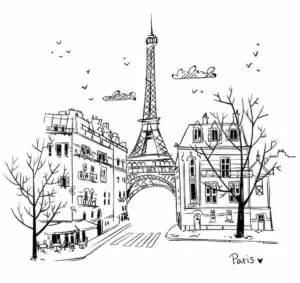Have you ever wondered how to say “cheers” in French? Toasting is an integral part of French culture, and knowing the right phrases and traditions can enhance your experience and show respect for French customs. In this guide, we will explore the various ways to toast in French and delve into the fascinating traditions associated with it.

✅ AI Essay Writer ✅ AI Detector ✅ Plagchecker ✅ Paraphraser
✅ Summarizer ✅ Citation Generator
Why it’s Important to Say “Cheers” in French
Toasting in French is not just a casual act; it carries cultural significance and demonstrates good manners. According to tradition, failing to adhere to proper toasting etiquette can result in seven years of bad luck. Even if you don’t believe in superstitions, it’s essential to learn the etiquette to respect French customs and understand their culture better.
À Votre Santé: A Toast in French
One of the most common and versatile toasts in French is “À votre santé,” which translates to “To your health.” It can be used in both formal and informal situations, making it a go-to phrase for various occasions. However, if you’re in a less formal setting or toasting to a single person, you can modify the phrase to “À tu santé,” where “tu” signifies a more familiar tone.
À la Vôtre: Returning the Toast
When responding to a toast or returning good health wishes, you can use the phrase “À la vôtre,” meaning “To yours.” This expression is commonly used in formal settings to reciprocate the goodwill extended by the person initiating the toast. In a more familiar context, you may opt for “À la tienne,” which carries the same meaning but is less formal.
Santé: Simplified Cheers in French
If you prefer a concise and straightforward way to say “cheers” in French, “Santé” is your go-to phrase. Literally meaning “health,” it is a shortened version of “À votre santé” and carries the same well-wishing sentiment. By using “Santé,” you omit the “à” and the pronouns “votre” or “tu,” but they are implied within the toast.
Tchin Tchin: An International Influence
Interestingly, the French language has adopted the phrase “Tchin Tchin” from Chinese culture. This phrase originated during the Second Opium War when soldiers encountered the Chinese phrase “请请” (pronounced qǐng qǐng) meaning “please please” as an invitation to have drinks. “Tchin Tchin” is mostly used in informal settings among friends and is rarely used in formal occasions.
Trinquons: The Art of Clinking Glasses
“Trinquons” refers to the action of clinking glasses together during or after a toast. Derived from the verb “trinquer,” meaning “to drink,” this term invites everyone to make their glasses clink together, symbolizing unity and shared celebration. Additionally, “on trinque?” translates to “shall we toast?” and is used to propose a toast among friends.
Toasting Traditions and Etiquette
In French toasting culture, several traditions and expectations are important to observe:
- Maintain Eye Contact: When toasting, it is customary to make eye contact with the person or people you are toasting to. This gesture shows respect and engagement.
- Choose Alcoholic Beverages: To avoid any superstitions, it’s best to toast with alcoholic beverages, as toasting with water is believed to bring bad luck. In fact, some even claim that toasting with water could lead to death by drowning.
- Half-Filled Glasses: Ensure that your glass is filled halfway during a toast, striking a balance between participation and moderation.
- Avoid Crossed Glasses: When clinking glasses, it is considered improper to cross your glass with someone else’s. Instead, aim for a gentle tap and an exchange of smiles.
- No Ice in Wine: In formal settings, it is considered inappropriate to add ice to wine. Respect the wine’s flavors and enjoy it as it is meant to be.
- Include Everyone: When giving a toast, make sure to include the entire group, acknowledging their presence and celebrating together.
- Keep Your Glass Raised: Throughout the toast, it is customary to keep your glass raised, showcasing your engagement and respect for the occasion.
- Wait to Drink: It is polite to wait until everyone has finished exchanging cheers before taking a sip. This shows consideration for others and creates a sense of unity.
In conclusion, learning how to say “cheers” in French and understanding the associated traditions and etiquette is an essential aspect of embracing French culture. By following these customs, you can demonstrate respect, engage in meaningful toasts, and forge deeper connections with the people and traditions of France.
Remember, whether you choose the classic “À votre santé,” the simplified “Santé,” or the international influence of “Tchin Tchin,” the act of toasting in French is an opportunity to celebrate, connect, and appreciate the rich cultural heritage of France.
FAQ
Is it important to follow specific toasting traditions in French culture?
Yes, it is important to follow specific toasting traditions in French culture. Toasting is considered a social ritual, and adhering to the customs demonstrates respect for French etiquette and traditions. Failing to follow these traditions may be seen as impolite or disrespectful. By observing the toasting customs, you can enhance your cultural experience and create a positive impression among the French.
Can you provide examples of French toasts and their meanings?
Certainly! Here are a few examples of French toasts and their meanings:
- À votre santé: This is one of the most common toasts in French, meaning “To your health.” It is used in both formal and informal settings and is a general way to express good wishes and celebrate.
- À la tienne: This toast is used to express good wishes to a single person, in a more familiar context. It translates to “To yours” and signifies a friendly and informal sentiment.
- Santé: A shortened version of “À votre santé,” this toast simply means “Health.” It is a concise and widely used way to say “cheers” in French.
- Tchin Tchin: This phrase has its origins in Chinese culture and is used in French to mean “cheers.” It is typically used among friends in informal settings.
Are there any superstitions or beliefs associated with toasting in French?
Yes, there are superstitions and beliefs associated with toasting in French culture. One such belief is that if you fail to follow the toasting traditions, you may experience seven years of bad luck. Additionally, it is considered unlucky to toast with non-alcoholic beverages, especially water, as it is believed to signify death by drowning. These superstitions highlight the significance of adhering to proper toasting etiquette and cultural norms in French society.
Follow us on Reddit for more insights and updates.





Comments (0)
Welcome to A*Help comments!
We’re all about debate and discussion at A*Help.
We value the diverse opinions of users, so you may find points of view that you don’t agree with. And that’s cool. However, there are certain things we’re not OK with: attempts to manipulate our data in any way, for example, or the posting of discriminative, offensive, hateful, or disparaging material.